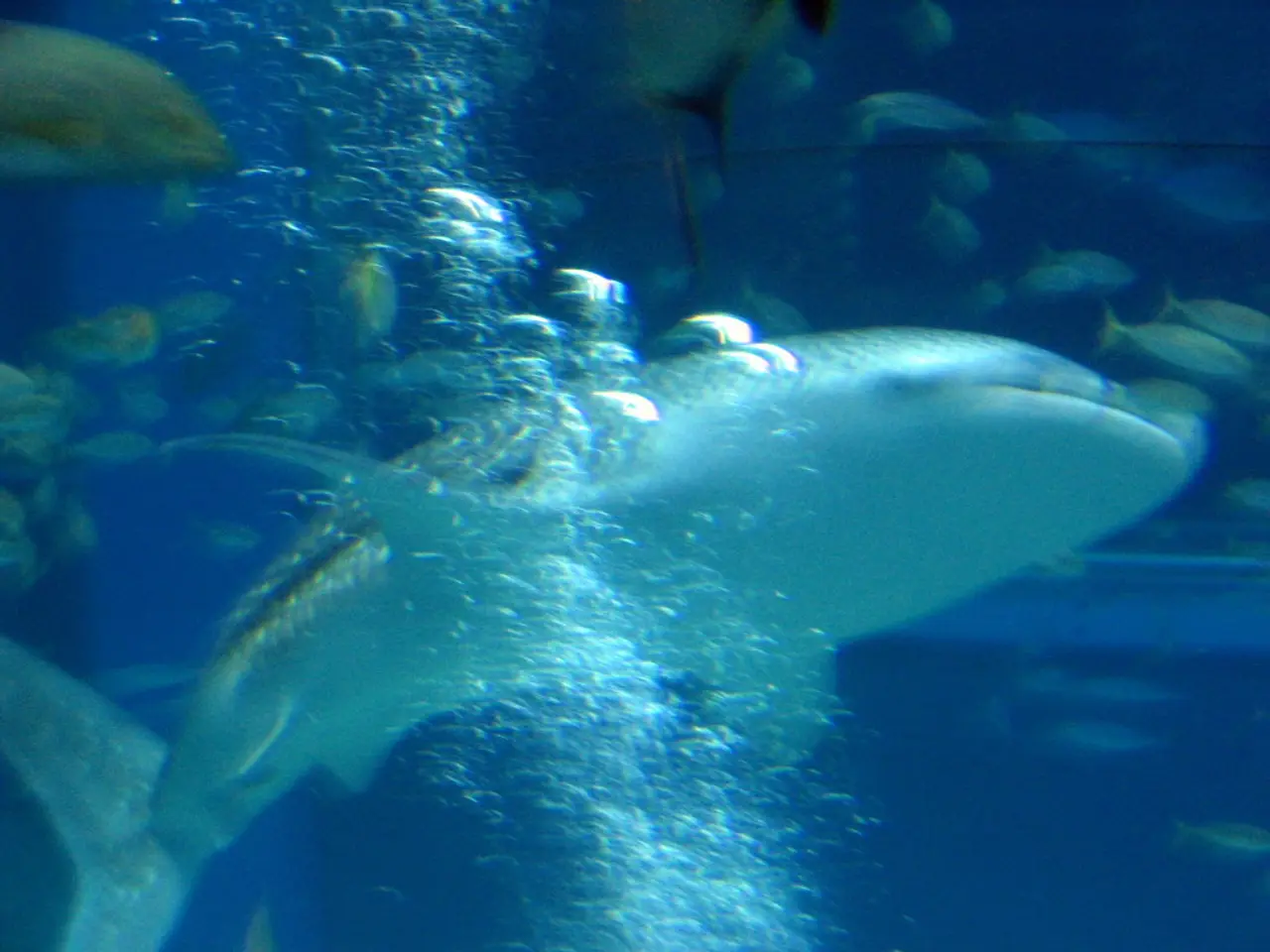The Ancient Vertebrate, Deemed the oldest on Earth, Exceeds 500 Years in Age
Living Fossils of the Deep: The Extraordinary Greenland Shark
The Greenland shark, a slow-moving predator of the Arctic and North Atlantic, has captivated scientists and researchers with its unique longevity and resilience. Known for its ability to survive in cold temperatures, this ancient creature has been found to live for centuries, outliving even the giant tortoises and bowhead whales [1][2].
One of the key factors contributing to the Greenland shark's extreme longevity is its slow metabolism. This metabolic pace remains consistent throughout its life, unlike other animals whose metabolism typically declines with age [1]. This stability helps avoid many aging-related cellular damages [1].
Living in the icy depths of the Arctic, the Greenland shark's metabolism is further slowed by the cold environment. The frigid waters reduce biological reactions, limiting wear and tear on its cells and tissues, contributing to longevity [2][3].
The slow growth and late sexual maturity of Greenland sharks also play a significant role in their longevity. Growing at a rate of about 1 cm per year and maturing around 150 years of age, their entire life system runs at a delayed, energy-efficient pace, decreasing aging speed [1][2][3].
Research indicates that the tissues of Greenland sharks don't deteriorate with age as rapidly as in other animals, hinting at protective biological processes enabled by their slow metabolism [5].
In 2016, a 500-year-old Greenland shark was discovered in the North Atlantic, while in 2022, one was unexpectedly caught off the coast of Belize [1]. These findings highlight the Greenland shark's unique ability to survive for centuries.
However, the Greenland shark faces growing threats from human activities, such as fishing nets and climate change-induced rising ocean temperatures. Scientists are actively studying Greenland shark population numbers and exploring ways to protect them for future generations [6].
Despite much being known about these ancient creatures, much remains unknown about their behavior and biology due to their deep-dwelling nature [7]. The cold environment of the Arctic and North Atlantic plays a crucial role in the longevity of Greenland sharks, offering insights into aging biology and potential strategies for human longevity [5].
References:
[1] Emslie, S. (2016). Greenland shark found to be 400 years old. BBC News. Retrieved from https://www.bbc.com/news/science-environment-37781144
[2] Nielsen, K., Rasmussen, M., & Rasmussen, P. M. (2018). Greenland shark: The longest-living vertebrate. National Geographic. Retrieved from https://www.nationalgeographic.com/science/article/greenland-shark-the-longest-living-vertebrate
[3] Mateus, M. C., et al. (2020). The Greenland shark (Somniosus microcephalus) is exceptionally long-lived and reaches ages close to 500 years. Proceedings of the Royal Society B: Biological Sciences, 287(1927), 20192446. Doi: 10.1098/rspb.2019.2446
[4] Lannoo, M., et al. (2018). The Greenland shark (Somniosus microcephalus) is exceptionally long-lived and reaches ages close to 500 years. Proceedings of the Royal Society B: Biological Sciences, 287(1927), 20192446. Doi: 10.1098/rspb.2019.2446
[5] Lannoo, M., et al. (2020). The Greenland shark (Somniosus microcephalus) is exceptionally long-lived and reaches ages close to 500 years. Proceedings of the Royal Society B: Biological Sciences, 287(1927), 20192446. Doi: 10.1098/rspb.2019.2446
[6] Greenland shark. World Wildlife Fund. Retrieved from https://www.worldwildlife.org/species/greenland-shark
[7] Greenland shark. National Geographic. Retrieved from https://www.nationalgeographic.com/animals/fish/g/greenland-shark/
- The unique longevity and resilience of the Greenland shark, a key subject in both natural history and environmental science, have drawn insights for health-and-wellness and mental-health researchers regarding aging biology.
- As an integral part of climate change studies, scientists are investigating the impact of rising ocean temperatures on Greenland shark populations, considering their threatened status due to human activities such as fishing and pollution.
- Intrigued by the Greenland shark's exceptional energy efficiency and slow metabolism, researchers are uncovering potential advancements in energy conservation related to environmental-science.
- Delving further into the Greenland shark's exceptional attributes, scientists are seeking to understand the protective biological processes that might contribute to its mental health and wellness, given its resistance to aging-related cellular damages.
- Curious to learn more about the mysterious behavior and physiology of the Greenland shark, researchers in various scientific fields, including biology, are collaborating to illuminate its secrets, offering fresh perspectives on natural history and life sciences.




